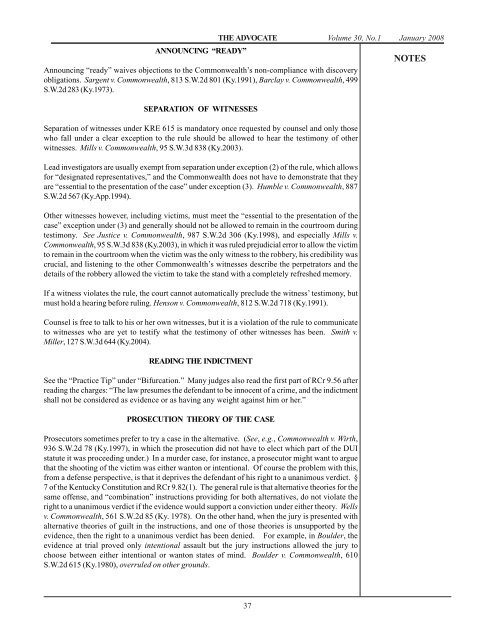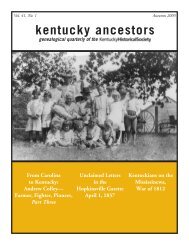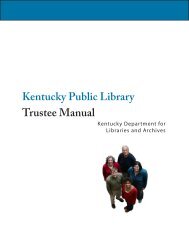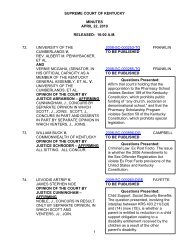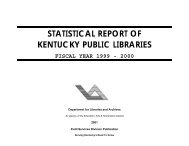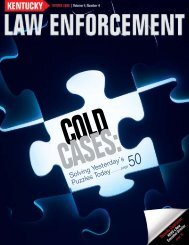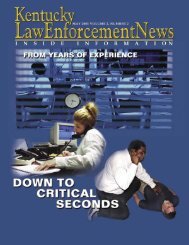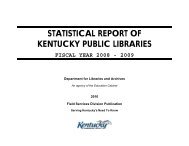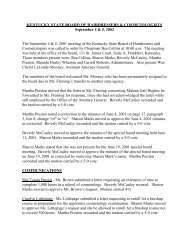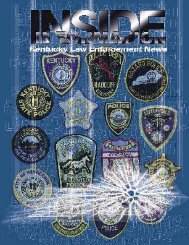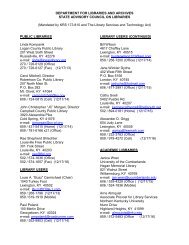Jan08 Advo.pmd - e-archives Home
Jan08 Advo.pmd - e-archives Home
Jan08 Advo.pmd - e-archives Home
You also want an ePaper? Increase the reach of your titles
YUMPU automatically turns print PDFs into web optimized ePapers that Google loves.
ANNOUNCING “READY”<br />
THE ADVOCATE Volume 30, No.1 January 2008<br />
Announcing “ready” waives objections to the Commonwealth’s non-compliance with discovery<br />
obligations. Sargent v. Commonwealth, 813 S.W.2d 801 (Ky.1991), Barclay v. Commonwealth, 499<br />
S.W.2d 283 (Ky.1973).<br />
SEPARATION OF WITNESSES<br />
Separation of witnesses under KRE 615 is mandatory once requested by counsel and only those<br />
who fall under a clear exception to the rule should be allowed to hear the testimony of other<br />
witnesses. Mills v. Commonwealth, 95 S.W.3d 838 (Ky.2003).<br />
Lead investigators are usually exempt from separation under exception (2) of the rule, which allows<br />
for “designated representatives,” and the Commonwealth does not have to demonstrate that they<br />
are “essential to the presentation of the case” under exception (3). Humble v. Commonwealth, 887<br />
S.W.2d 567 (Ky.App.1994).<br />
Other witnesses however, including victims, must meet the “essential to the presentation of the<br />
case” exception under (3) and generally should not be allowed to remain in the courtroom during<br />
testimony. See Justice v. Commonwealth, 987 S.W.2d 306 (Ky.1998), and especially Mills v.<br />
Commonwealth, 95 S.W.3d 838 (Ky.2003), in which it was ruled prejudicial error to allow the victim<br />
to remain in the courtroom when the victim was the only witness to the robbery, his credibility was<br />
crucial, and listening to the other Commonwealth’s witnesses describe the perpetrators and the<br />
details of the robbery allowed the victim to take the stand with a completely refreshed memory.<br />
If a witness violates the rule, the court cannot automatically preclude the witness’ testimony, but<br />
must hold a hearing before ruling. Henson v. Commonwealth, 812 S.W.2d 718 (Ky.1991).<br />
Counsel is free to talk to his or her own witnesses, but it is a violation of the rule to communicate<br />
to witnesses who are yet to testify what the testimony of other witnesses has been. Smith v.<br />
Miller, 127 S.W.3d 644 (Ky.2004).<br />
READING THE INDICTMENT<br />
See the “Practice Tip” under “Bifurcation.” Many judges also read the first part of RCr 9.56 after<br />
reading the charges: “The law presumes the defendant to be innocent of a crime, and the indictment<br />
shall not be considered as evidence or as having any weight against him or her.”<br />
PROSECUTION THEORY OF THE CASE<br />
Prosecutors sometimes prefer to try a case in the alternative. (See, e.g., Commonwealth v. Wirth,<br />
936 S.W.2d 78 (Ky.1997), in which the prosecution did not have to elect which part of the DUI<br />
statute it was proceeding under.) In a murder case, for instance, a prosecutor might want to argue<br />
that the shooting of the victim was either wanton or intentional. Of course the problem with this,<br />
from a defense perspective, is that it deprives the defendant of his right to a unanimous verdict. §<br />
7 of the Kentucky Constitution and RCr 9.82(1). The general rule is that alternative theories for the<br />
same offense, and “combination” instructions providing for both alternatives, do not violate the<br />
right to a unanimous verdict if the evidence would support a conviction under either theory. Wells<br />
v. Commonwealth, 561 S.W.2d 85 (Ky. 1978). On the other hand, when the jury is presented with<br />
alternative theories of guilt in the instructions, and one of those theories is unsupported by the<br />
evidence, then the right to a unanimous verdict has been denied. For example, in Boulder, the<br />
evidence at trial proved only intentional assault but the jury instructions allowed the jury to<br />
choose between either intentional or wanton states of mind. Boulder v. Commonwealth, 610<br />
S.W.2d 615 (Ky.1980), overruled on other grounds.<br />
37<br />
NOTES


